By James Tabafunda
NORTHWEST ASIAN WEEKLY
The 13th annual Asian and Native Hawaiian/Pacific Islander (A&NH/PI) Primary Election Candidate Forum drew an overflow crowd to the Wing Luke Museum’s Ford Foundation Community Hall on July 23, where candidates for Seattle City Council faced pointed questions on public safety, housing, and social equity.
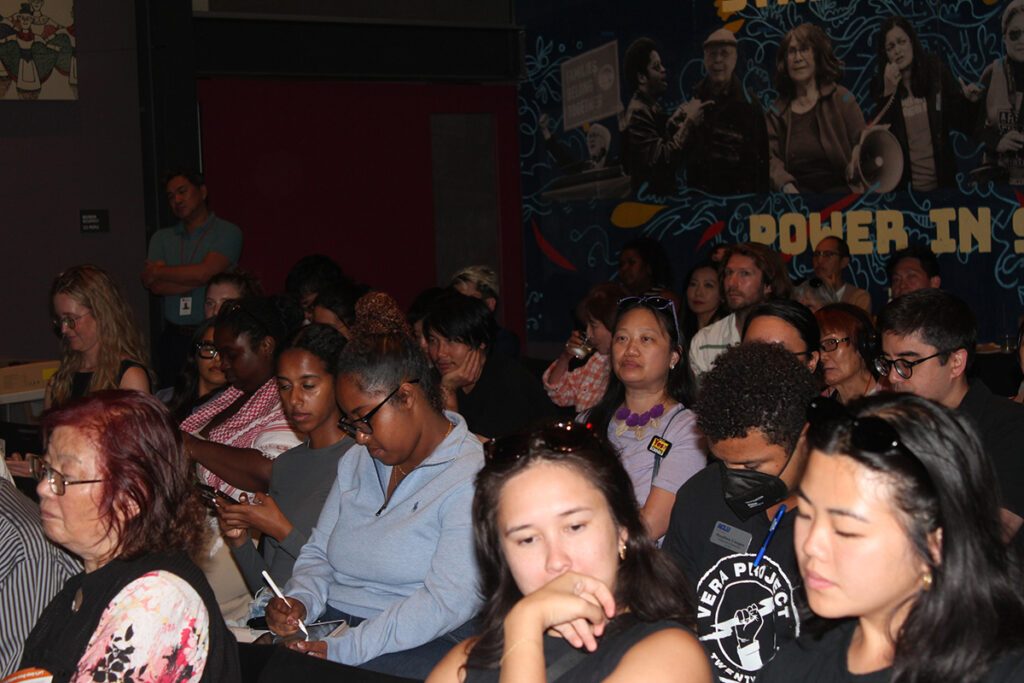
Over 100 people gathered at the Wing Luke Museum with the overflow moved to a nearby area for Cantonese translation. (Photo by James Tabafunda)
With about 100 seats available in the Community Hall, the overflow of attendees required a nearby area for Cantonese speakers, highlighting the area’s linguistic vibrancy and the high community stakes of the city’s 2025 election.
Sam Prudente, emcee and case manager at Asian Counseling and Referral Service (ACRS), reminded all candidates to speak slowly for interpreters more than once, underlining the multilingual and multicultural nature of the attendees.
Diverse field, shared urgency
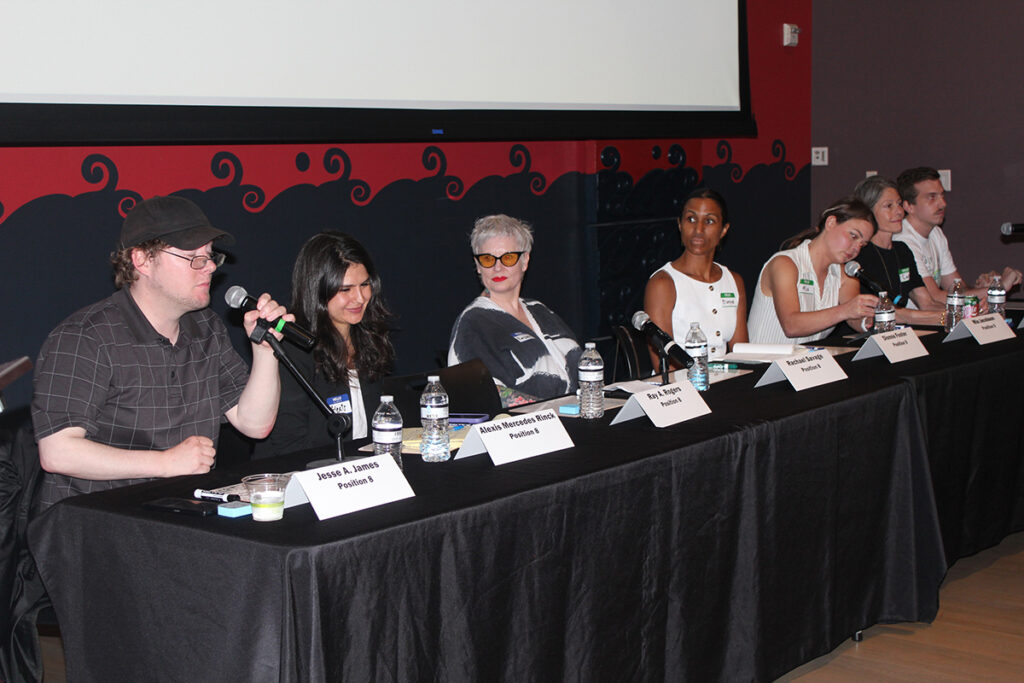
(From): Jesse A. James, Alexis Mercedes Rinck, Rachael Savage, Dionne Foster, Mia Jacobson, Sara Nelson, and Connor Nash. (Photo by James Tabafunda)
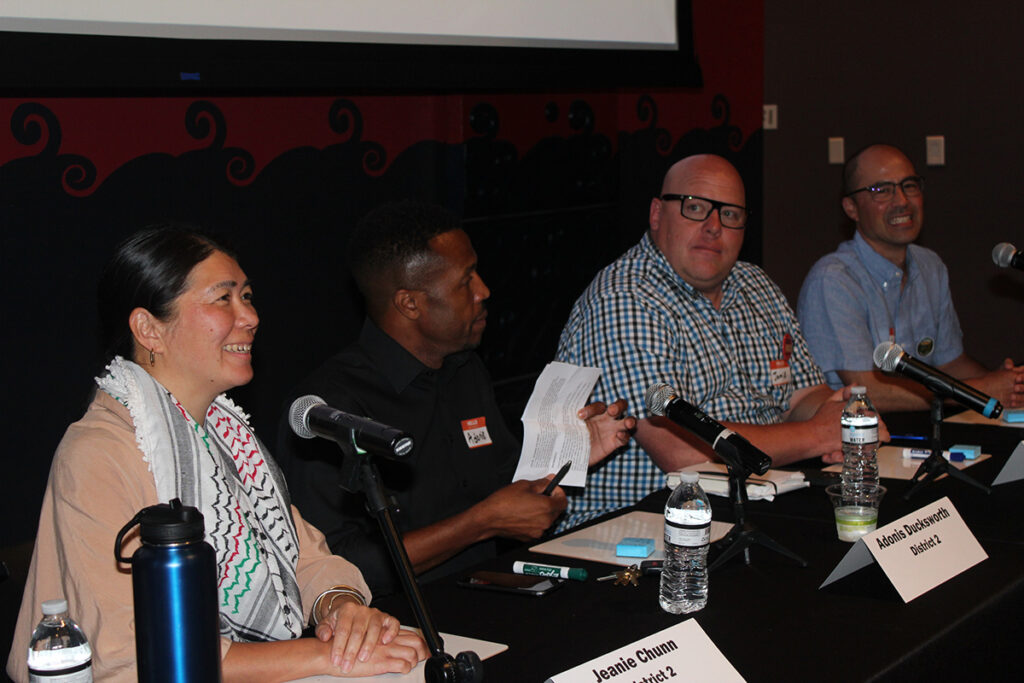
(From left): Jeanie Chunn, Adonis Ducksworth, Jamie Fackler, and Eddie Lin. (Photo by James Tabafunda)
The forum—organized by a coalition of organizations, including Refugee Women’s Alliance, ACRS, InterIm Community Development Association, Chinese Information and Service Center, United Territories of Pacific Islanders Alliance Washington, and the Wing Luke Museum— featured candidates for City Council positions 8, 9, and District 2. Position 8 included Jesse A. James, Alexis Mercedes Rinck, Rachael Savage, and an empty seat for absent Ray A. Rogers. Position 9 included Dionne Foster, Mia Jacobson, Sara Nelson, and Connor Nash. Four candidates—Jeanie Chunn, Adonis Ducksworth, Jamie Fackler, and Eddie Lin—took the stage later, competing for District 2.
Opening statements highlight core issues
Candidates’ top priorities echoed some of the city’s most pressing concerns:
- Affordable housing & cost of living: Rising rents in Seattle remain a problem, with median rents among the highest of any large U.S. city. Foster and Nelson pointed to “affordability” and workforce housing, while Rinck cited her own experience as a renter.
- Public safety: Gun violence and anti-Asian hate crimes have increased across the nation, including in Seattle, where the Chinatown-International District (CID) has had its own high-profile incidents in recent years. Candidates varied in their approaches, from expanding alternative response teams to rebuilding traditional law enforcement.
- Representation: Nash emphasized his residency in the CID, arguing for “real solutions” led by those most affected.
Immigration and tension with the Trump administration
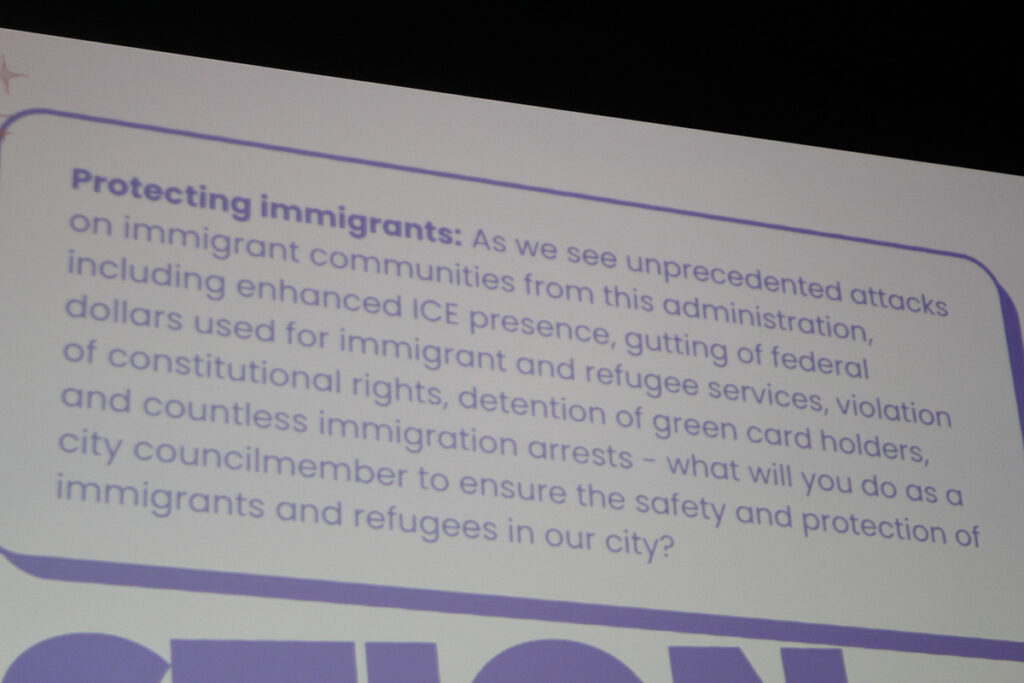
Savage, framing the issue from a law-and-order perspective, said that strong law enforcement creates a safer environment for immigrants and all residents.
Budget deficit and progressive revenue
With the city facing a $250 million budget deficit, the candidates differed on fiscal priorities. Progressive revenue—taxing high earners and large corporations—was the preferred solution for several candidates. Rinck and Foster backed the “Seattle Shield” initiative, a recent city council proposal lowering tax rates for most small businesses while raising taxes on the largest corporations to fund essential city services. Nash advocated for similar measures, while Nelson warned that even with new taxes, the deficit would require planned reductions, though “protecting basic services” would be a priority.
Washington’s constitutional restrictions limit the range of new city taxes, cited James, underscoring the complexity of Washington’s reliance on regressive tax structures.
Homelessness, encampments, and “sweeps”
The recent Supreme Court ruling in Grants Pass v. Johnson, allowing local criminalization of outdoor sleeping in Oregon, has added to the local debate over encampment “sweeps”—clearing homeless encampments from public spaces. Most candidates opposed such bans in Seattle, emphasizing housing-first strategies over more punitive actions. Savage voiced support for bans, framing such encampments as public safety hazards, while the majority supported treatment services and increased housing.
Ethics, police powers, and public safety
Nearly every candidate opposed city council members voting on matters in which they have a financial conflict of interest, underscoring demands for stronger ethics.
Drug addiction, targeted anti-Asian incidents, pedestrian safety, and gun violence were cited by all as urgent priorities. Nelson linked the fentanyl crisis with critical problems in both homelessness and public safety, and described efforts to expand drug treatment and fund “ambassador” programs in high-need neighborhoods. Nash and others called for community-led, safety programs, particularly in the CID and Little Saigon—areas regularly affected by under-policing and displacement.
Second half with District 2 candidates
Chunn, Ducksworth, Fackler, and Lin presented visions dealing with historic inclusion, affordability, and anti-displacement for the city’s most diverse district. Their stories reflect District 2’s working-class, immigrant history.
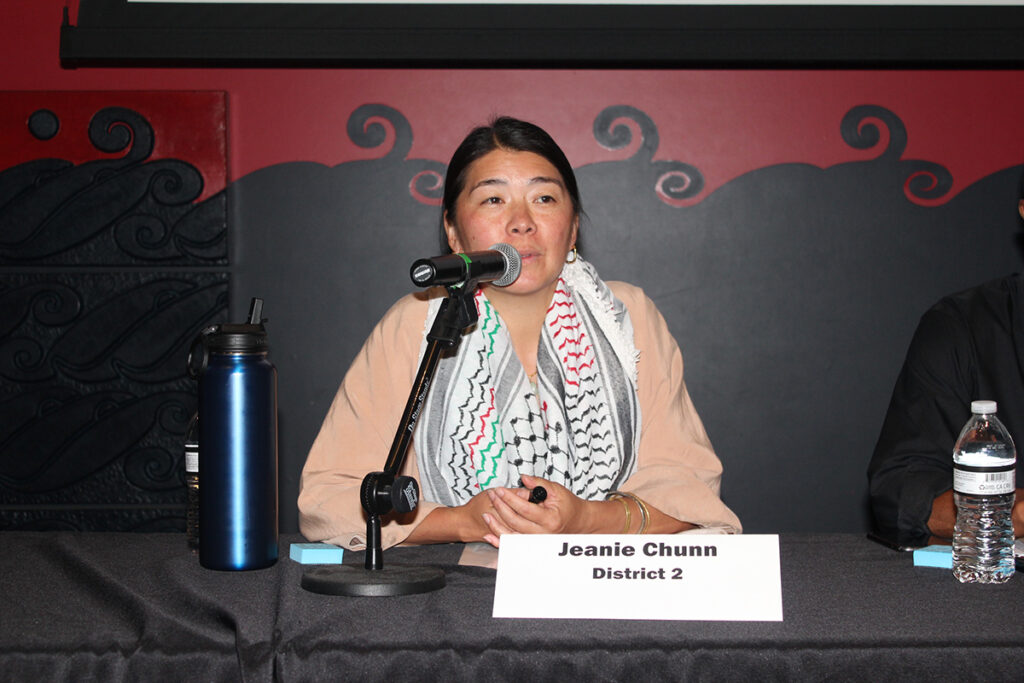
Seattle City Council District 2 candidate Jeanie Chunn (Photo by James Tabafunda)
Chunn, the daughter of Chinese immigrants and a longtime restaurant worker, spoke about how she once managed to support her daughter as a waitress in Seattle—something she sees as nearly impossible today due to skyrocketing housing costs.
“Affordable housing is really important to me as one of my top priorities,” Chunn said. She also emphasized progressive revenue—raising taxes on major corporations to fund housing and services—and stronger support for small businesses as key issues.
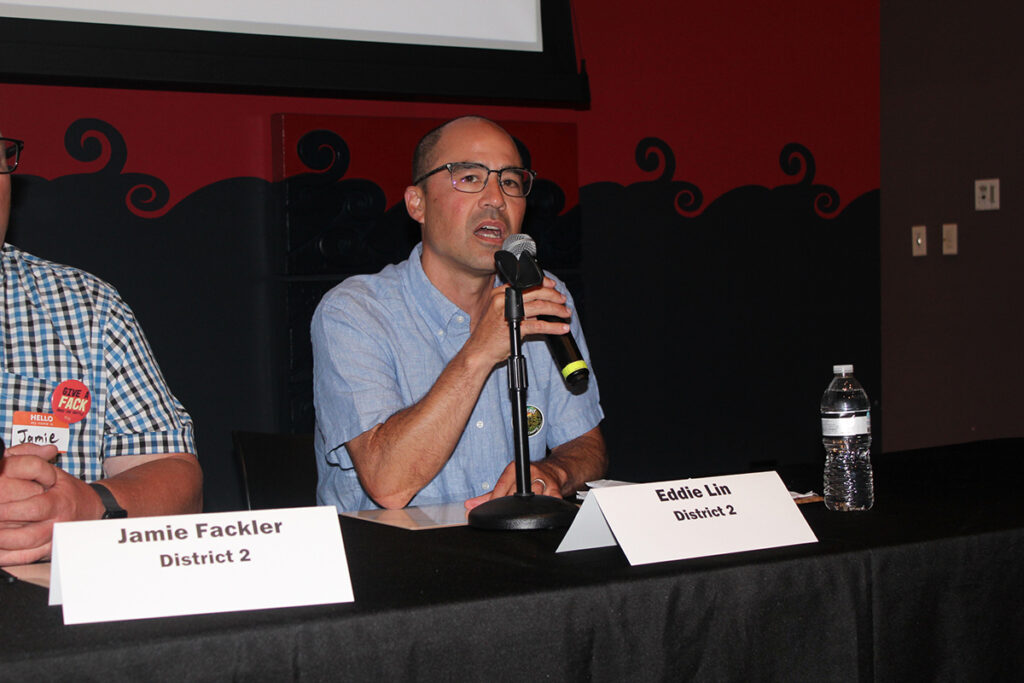
Seattle City Council District 2 candidate Eddie Lin (Photo by James Tabafunda)
Lin, a city attorney’s office staffer who has spent years working with the Office of Housing, tied his priorities to lived experience as the son of a Taiwanese immigrant father and a white mother from Massachusetts.
“My top priority is to address our housing crises, our homelessness crisis, and to get people the drug and mental health treatment they need, and to tax our wealthiest corporations to fund our essential needs.” He highlighted permanent supportive housing as a proven model for tackling the homelessness crisis.
Fackler, a union shop steward and building inspector for the city, described the government’s ongoing failure to include CID and other communities in critical decisions, citing a legacy of top-down development.
Ducksworth, with deep family ties to Beacon Hill, stressed the city’s need for more accountable police and outreach workers.
“I would hope that officers are accountable, representative, and can build relationships. Otherwise, they have no business being a police officer in Seattle,” he said. He is also committed to opening a district council office for his constituents since the transition to a district-based system beginning with voter approval in 2013.
Housing and “sweeps”
All four candidates reaffirmed housing affordability as District 2’s top challenge, citing the disappearance of working-class families from neighborhoods with a rich history of immigrant and minority residents. Seattle rents have increased by more than 80% since 2010, and home prices have more than doubled in 15 years, making homeownership an unattainable goal for most people.
On the issue of encampment “sweeps,” Prudente posed a direct yes or no question. All four candidates opposed the sweeps, including Lin, who suggested instead a “comprehensive approach,” combining permanent housing, co-response teams like Seattle Fire Department’s Health One and the city’s Community Assisted Response and Engagement (CARE) program, and expanded drug treatment. All candidates agreed the CARE team is understaffed, and supported separating crisis response from the police department to ensure specialized, non-police professionals respond to residents experiencing behavioral health crises or homelessness.
Ethics, budget deficit, and progressive revenue
The candidates also unanimously opposed changing the city’s ethics rules to allow council members with a financial conflict of interest to vote on certain legislation—as long as they publicly disclose their conflict.
Seattle faces a projected $250 million budget deficit in 2026, raising the need for new revenue sources. All four District 2 candidates endorsed the “Seattle Shield” initiative.
Solidarity with immigrants and refugees
Alarm over increased federal immigration enforcement was clearly front and center at the forum. Both Lin and Chunn urged expanded support for organizations like the Northwest Immigrant Rights Project and financial resources for workers, including undocumented and refugee employees in the hospitality industry. Fackler described deeply personal family impacts of deportation, and all four candidates expressed support for Seattle’s status as a sanctuary city: refusing cooperation with ICE, prohibiting city facilities from being used for detentions, and maintaining steady funding for legal support for immigrants and refugees.
Displacement and equitable development
Lin, who works directly on affordable housing policy, advocated for boosting the city’s Equitable Development Initiative—a program that funds anti-displacement and community health projects, particularly in the south end. “It was disingenuous for the council to say funds were being spent too slowly. These projects take years,” Lin explained, vowing to fight for sustained and increased funding.
All four candidates said anti-displacement protections—recently removed from the city’s draft comprehensive plan—should be reinstated to prevent further loss of community and cultural gains in the CID and Rainier Valley.
The event ended with a call for voter registration and a reminder of the high stakes for Seattle’s rapidly changing neighborhoods.

Wow, unbelievable that so many of the candidates OPPOSE sweeps of homeless drug encampments, which have been a HUGE problem in the INternationl District. There needs to be a BAN on tents and encampments in the city, once and for all. Even Oregon is embracing that model. Seattle politicians continue to double down on the failed policies from the “summer of love”… SAD.